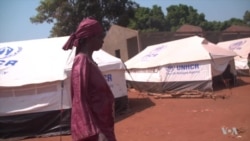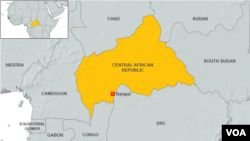Violence continues to flare in the Central African Republic, despite an election that brought a new government to the country in February. At times, the fighting is between Muslim and Christian militia. But in late November, two different groups tied to the Muslim Seleka militia fought in the northeastern town of Bria, leaving an estimated 85 civilians dead and 80 wounded.
The violence also displaced nearly 13,000 people — nearly 20 percent of the city's population.
Salamatou Abubakar fled to a makeshift refugee camp in Zongo, C.A.R., after fighters came to her house and robbed her.
"I'm scared," she said, "because I have nobody to help me and I'm a bit blind. So I'm scared about the future."
Abubakar, who has eight children, said she was afraid to return to her neighborhood. Yet in the camp, she said, there's not enough food or blankets.
"You can see my kid sleeping on the floor without blankets," she said, adding, "I have nothing to cook, nothing left, and I'm worried about getting by."
About 5,000 people live in the Zongo camp. Jean Louis Banda Doumba, 42, said he was the first to arrive. He used to be a fighter himself but volunteered to turn in his gun as part of demobilization efforts.
Threats from militants
In late November, he ran to a U.N. base for protection. Militants have called him, threatening to kidnap him for putting down his weapon.
"I'm just telling them that I'm just here to avoid problems," he said, "not to betray anybody. I don't want to take any risk to my life by leaving here. I gave up my weapon for peace. I don't want war."
Doumba said people were in the camp because their neighborhoods were still insecure. They need more help, he said, because they can't go home.
Pierre Burgos of of the Oxfam charity said aid organizations were working to fill the gaps.
"People have access now to water, sanitation and hygiene. But [there are] still needs, apparently, in terms of shelter, in terms of access to food," he said.
Oliver Madwende, field manager for International Medical Corps in Bria, and he'd seen a quick rise in medical needs.
"In terms of medical, there was need for patients who are having malnutrition, but also there was need of pregnant women, preventing disease in those camps," he said. "Plenty of cases of diarrhea, respiratory disease, plenty of cases of malaria. … This is a direct result of the fighting."
Madwende said it was tough for his team to do its work because of the poor security situation.
"It means it was difficult to move around," he said. "All shops were closed. And there were plenty of soldiers around the town, everywhere."
Civilians told VOA that the roughly 250 U.N. troops in Bria did nothing to stop the fighting, although the U.N. mission reported its troops patrolled the city and had taken steps to protect refugee camps.






